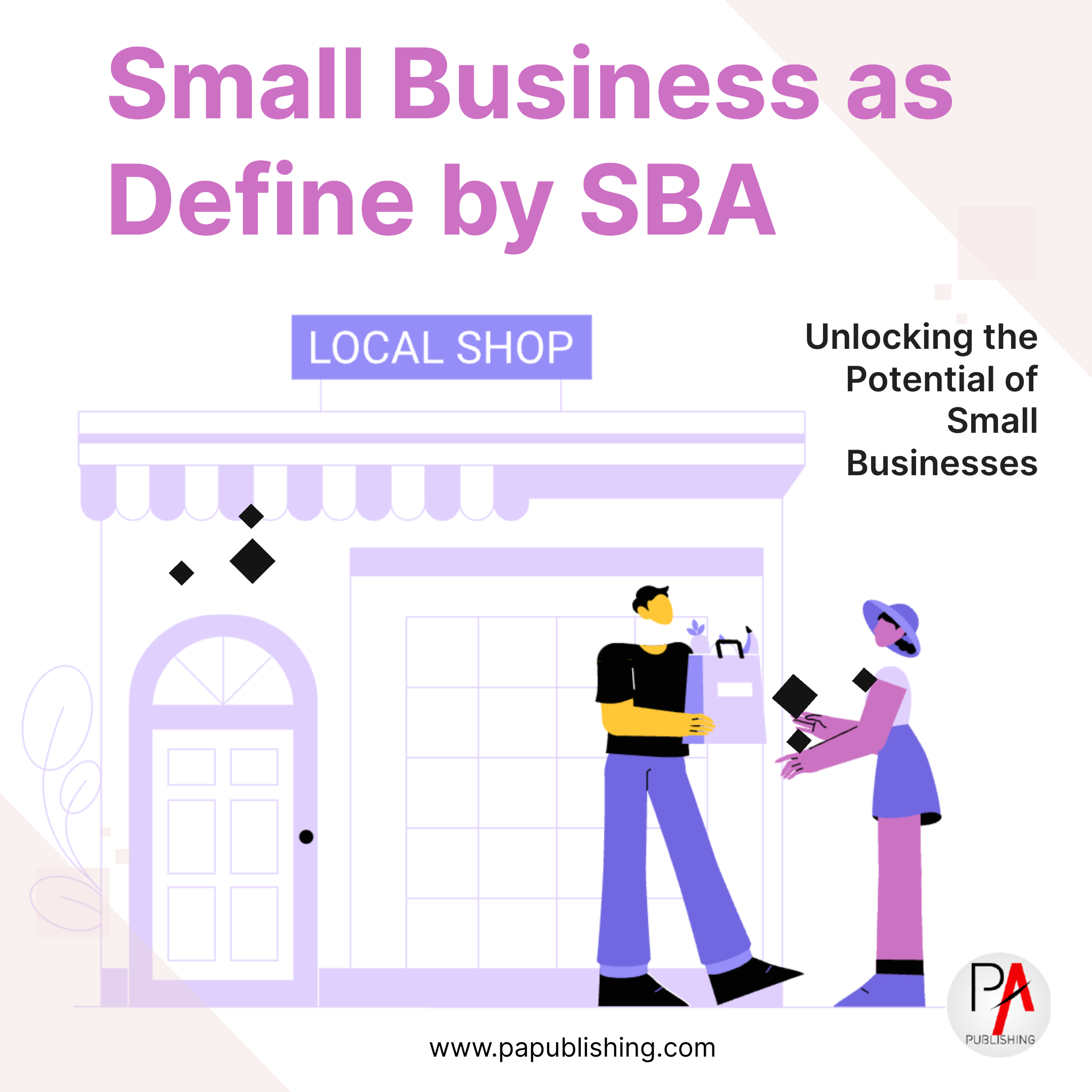Small Business as Define by SBA: The Small Business Administration (SBA) is a government agency that supports small businesses. Its mission is to help entrepreneurs start, grow, and succeed. The SBA provides a range of resources and services to assist small businesses in various aspects of their operations. These include access to capital through loan programs, counseling and training services, and assistance with government contracting.
Small Business as Define by SBA (Small Business Association)
Defining Small Businesses: The SBA’s Criteria
The SBA uses size standards to determine if a business is considered small. These standards vary by industry and are based on either the number of employees or annual revenue. For example, in the manufacturing industry, a business is considered small if it has fewer than 500 employees, while in the retail trade industry, a business is considered small if its annual revenue is less than $7 million.
Understanding Size Standards and NAICS Codes
Small Business as Define by SBA: In order to determine eligibility for SBA programs, it is important for small businesses to understand size standards and NAICS codes. NAICS codes are used to classify businesses by industry. The SBA’s size standards are based on these codes. By identifying the appropriate NAICS code for their industry, small businesses can determine if they meet the size standards set by the SBA.
SBA Certification Programs: 8(a), HUBZone, and WOSB
| Metrics | Description |
|---|---|
| Number of Size Standards | The total number of size standards established by the Small Business Administration (SBA). |
| NAICS Code | The North American Industry Classification System (NAICS) code is a standardized system used to classify businesses by industry. |
| Size Standards by Industry | The SBA sets size standards for each industry based on the number of employees or annual revenue. |
| Eligibility for Government Contracts | Small businesses that meet the size standards for their industry are eligible to compete for government contracts set aside for small businesses. |
| Size Standards Review | The SBA reviews and updates size standards periodically to reflect changes in the economy and industry. |
The SBA offers certification programs for certain types of small businesses. These programs provide access to government contracts and other resources. The 8(a) Business Development program is designed to help socially and economically disadvantaged businesses. The Historically Underutilized Business Zones (HUBZone) program provides opportunities for businesses located in economically distressed areas. The Women-Owned Small Business (WOSB) program supports women-owned businesses in industries where they are underrepresented.
Benefits of SBA Support for Small Businesses
Small Business as Define by SBA: SBA support can provide numerous benefits for small businesses. One of the key benefits is access to capital. The SBA offers loan programs that can help small businesses secure financing when traditional lenders may be hesitant to lend to them. Additionally, the SBA can help small businesses navigate the government contracting process, providing opportunities for growth and expansion. SBA support also includes counseling and training services, which can help small business owners develop the skills and knowledge needed to succeed.
Accessing SBA Resources and Services

Small businesses can access SBA resources and services through various channels. SBA district offices are located throughout the country and provide local assistance to small businesses. These offices offer counseling, training, and other resources tailored to the needs of small businesses in their respective regions. In addition to district offices, the SBA has a network of resource partners, including Small Business Development Centers (SBDCs), Women’s Business Centers (WBCs), and SCORE chapters, which provide additional support and expertise. Finally, the SBA’s website offers a wealth of information and resources that can be accessed online.
SBA Loan Programs: Types and Requirements
Small Business as Define by SBA: The SBA offers several loan programs to help small businesses access capital. These programs have different requirements and terms, so it is important for small business owners to understand their options before applying for a loan. The most popular SBA loan program is the 7(a) Loan Program, which provides funding for a variety of business purposes, including working capital, equipment purchases, and real estate. Other loan programs offered by the SBA include the CDC/504 Loan Program, which is designed for real estate and equipment financing, and the Microloan Program, which provides small loans to start-up and growing businesses.
Common Challenges Faced by Small Businesses
Small businesses face a variety of challenges that can hinder their success. One of the biggest challenges is access to capital. Many small businesses struggle to secure financing from traditional lenders, who may view them as risky investments. This can make it difficult for small businesses to fund their operations or invest in growth opportunities. Another challenge is competition from larger corporations. Small businesses often find themselves competing against larger companies with more resources and established customer bases. Finally, regulatory compliance can be a challenge for small businesses, as they may not have the same level of expertise or resources as larger companies to navigate complex regulations.
Maximizing Small Business Success with SBA Assistance
Small Business as Define by SBA: Small businesses are vital to the economy and face unique challenges. The SBA offers a range of programs and resources to help small businesses start, grow, and succeed. By understanding and accessing SBA assistance, small businesses can maximize their chances of success. Whether it’s accessing capital through SBA loan programs, receiving counseling and training services, or taking advantage of government contracting opportunities, small businesses can benefit greatly from the support provided by the SBA. With the right resources and guidance, small businesses can overcome obstacles and thrive in today’s competitive business landscape.
If you’re a small business owner looking to boost your revenue, you may find this article on sales techniques helpful. It provides valuable insights and strategies to help you increase your sales and drive more revenue for your business. Check it out here.

FAQs
What is a small business according to the SBA? (Small Business as Define by SBA)
The Small Business Administration (SBA) defines a small business as a company that has fewer than 500 employees and generates less than $7.5 million in annual revenue.
What are the benefits of being classified as a small business by the SBA?
Small businesses that are classified by the SBA can access a range of benefits, including access to government contracts, loans, and grants. They may also be eligible for tax incentives and other forms of financial assistance.
What industries are considered small businesses by the SBA?
The SBA considers a wide range of industries to be small businesses, including manufacturing, retail, construction, and professional services. The specific criteria for each industry may vary, but generally, any company that meets the SBA’s size and revenue requirements can be classified as a small business.
How does the SBA determine whether a business is small?
The SBA uses a set of size standards to determine whether a business is small. These standards vary by industry and are based on factors such as the number of employees, annual revenue, and other relevant metrics. Businesses that fall within the SBA’s size standards are considered small businesses.
What are the challenges faced by small businesses?
Small Business as Define by SBA: Small businesses face a range of challenges, including limited access to capital, difficulty competing with larger companies, and regulatory compliance issues. They may also struggle to attract and retain skilled employees, and may face challenges in scaling their operations as they grow.


One Reply to “Small Business as Define by SBA: Unlocking the Potential of Small Businesses”
Comments are closed.